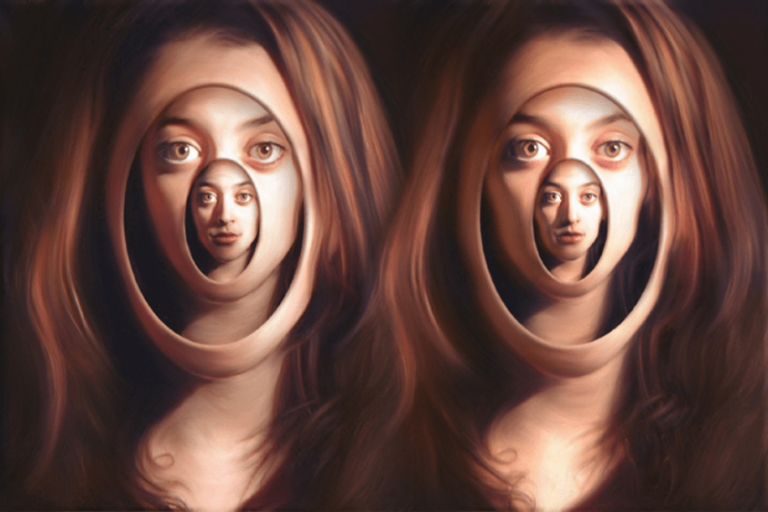“Trying to define yourself is like trying to bite your own teeth” ~ Alan Watts
Personality is defined as, “The set of emotional qualities, ways of behaving, etc., that makes a person different from other people; attractive qualities that make something unusual or interesting,” (Merriam-Webster Dictionary).
In theory this sounds great… right up our ego’s alley. To have qualities or behaviors that make us UNIQUE, DISTINGUISHABLE, and DIFFERENT from other people sounds like the perfect recipe to reinforce our separateness from others.
But is our personality who we really are? And who or what decides what our “personality” is? Since our perspective of ourselves may be vastly different than another person’s perspective of us, who would be the correct one if we were trying to define our specific “personality”?
One of the main properties of our ego is a craving for significance and a desire to be different than another. This craving can be manifested in any number of ways.
It can be in the adjectives we use to describe ourselves, “I am a deep-thinker, they are shallow” “I am kind and warm-hearted person, they are callous and cold” or “I am assertive, and aggressive, they are passive and weak” are all concepts we have in our minds about who we are. It can also manifest in the way we behave.

For instance, in any given situation or circumstance instead of responding with our natural instinct, we may find ourselves visiting our inner rolodex of “ways that are acceptable to respond based on who I ‘am’ (or who I think I am).”
In these instances we may find ourselves reacting in the same ways over and over to the same types of situations in our outer reality because we have limited ourselves to available options that coincide with our individual “personality.”
However, when we start to exist solely in these concepts of who we are and are attached to defining ourselves and others we may be limiting who we can become and consequently limit ourselves from being able to see other people for what they truly are… nobody.
In order to resonate in our own nobody-ness and start to see the nobody-ness in others we must first rise above our thought of who we were and what we thought has made us so different than others. But is that possible? Is it possible to transcend personality?
“We are alive in the present moment, the only moment there is for us to be alive.” ~ Thich Nhat Hanh
Personality can only really come from an attachment to an idea. We may have an idealized version of who we would like to be, or who would like the world to see us as in our heads that we begin to reinforce to ourselves over and over that this is who we are. Also, we may have picked up bits and pieces from what other people have said about us and attached ourselves to those labels as well.
For example, if enough people have told us that we are funny, we most likely will start to believe we are funny. Or if enough people have told us we are not funny, we may attach ourselves to that notion as well. However, all of these concepts depend on memory in order to survive.
We remember how we acted in a certain situation, we remember who we decided we wanted to be and are now acting in accordance with those beliefs, or we remember what someone said we were and are now behaving in accordance with the way a particular person chose to define us.
 By choosing to be and act how we’ve always acted we remain a prisoner of the past. But in the present moment personality cannot exist, only being can.
By choosing to be and act how we’ve always acted we remain a prisoner of the past. But in the present moment personality cannot exist, only being can.
Because personality is based in concepts and attachment to ideas, the minute we begin to explain our personality or ponder how we should react to something, based on how we were in the past, or how we want others to see us, we are immediately transported out of the present moment and into our own minds’ perspective of the present moment.
Yes, things like anger or sadness or rage can exist in the present moment. They can be experienced and felt and just as soon as they come they can also go. And we may have felt the emotion of anger 20 times in one day, but it doesn’t necessarily mean we ARE an angry person, all it means is we felt anger.
We felt it, and then it left us, but it has nothing to do with who we actually ARE. The less we try to define our personality we will then allow ourselves to be whatever pops up in that moment. We may experience sadness, or joy, or pure rage, but we will not attach ourselves to any of it, nor will we let it define who we are.
When we do this, we realize that other people we deal with are also not their personality, but just mere presence. They may experience outbursts of depression or anger but just like our own emotions are not who we are, but merely a sentiment that we felt in a particular moment, neither are theirs.
“Only those who are ready to become nobodies are able to love.” ~ Osho
 Become a “nobody.” Recognize that everyone you meet is a “nobody.” Let the spontaneous combustion of human emotions and feelings come naturally and experience them fully without attaching yourself to the qualities so much that you start to believe that you ARE them.
Become a “nobody.” Recognize that everyone you meet is a “nobody.” Let the spontaneous combustion of human emotions and feelings come naturally and experience them fully without attaching yourself to the qualities so much that you start to believe that you ARE them.
Sometimes you may feel generous and kind, and sometimes you will feel jealous and envious, but it is not your job to judge the emotions themselves, only to completely surrender to them.
In this “experiencing” of the energy of emotions rather than the judging of the emotions we will find that we are not our qualities, characteristics and attributes.
We are only the presence that exists in the present moment… which is really nothing and nobody, and so is everyone else we meet. In our complete un-attachment to personality and complete anchoring in the presence, only one thing can emerge… love.
Image Source



















 Our political leaders convinced us we needed more power, more weapons and more defense. So there were wars, people were killed on both sides and with each ending war another one soon started.
Our political leaders convinced us we needed more power, more weapons and more defense. So there were wars, people were killed on both sides and with each ending war another one soon started.


